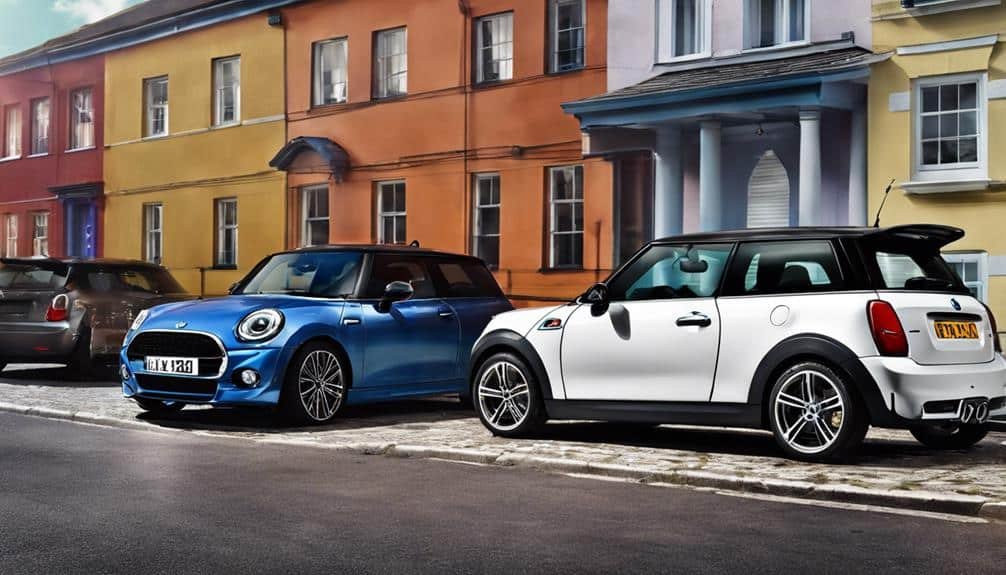When deciding between BMW and MINI Cooper, your choice will depend on factors like pricing, value retention, horsepower, passenger space, and warranty coverage. MINI Cooper tends to be more affordable and retains value better, with decent horsepower and fuel efficiency. BMW, on the other hand, offers more passenger and cargo space along with higher power-to-weight ratio. Each brand has its strengths, so consider your priorities to make the best decision for your preferences.
Pricing and Value
When comparing the pricing and value of BMW and Mini Cooper vehicles, it becomes evident that Mini Cooper generally offers better affordability and retains value more effectively than BMW models. MINI Cooper vehicles typically have a lower new and used vehicle starting price compared to BMW models. Additionally, MINI Coopers tend to depreciate at a lower rate than BMW vehicles, making them a more cost-effective choice in the long run.
In terms of quality ratings and reliability scores, MINI outshines some BMW models, further enhancing its overall value proposition. While BMW may offer higher maximum horsepower in base trims compared to MINI models, the combination of affordability, lower depreciation rates, and reliable performance makes MINI Cooper a compelling option for budget-conscious buyers seeking long-term value.
Ultimately, if you're looking for a vehicle that isn't only affordable upfront but also holds its value well over time, MINI Cooper presents a strong case against BMW in the pricing and value comparison.
Engine Power and Efficiency
Comparing the engine power and efficiency between BMW and Mini Cooper reveals distinct differences in horsepower and fuel economy performance.
The BMW 3 Series base engine boasts 230 horsepower, markedly higher than the MINI Cooper's 121 horsepower. However, when it comes to fuel efficiency, the MINI Cooper outshines the BMW 3 Series with an average of 31 mpg compared to the 20 mpg of the BMW.
Regarding highway range, the MINI Cooper also surpasses the BMW 3 Series, offering a range of 462 miles compared to the BMW's 419 miles. Additionally, the BMW 3 Series has a higher power-to-weight ratio of 0.061 hp per pound compared to the MINI Cooper.
In this comparison, the MINI Cooper emerges as the more fuel-efficient option with a longer highway range, providing context for those looking for a balance between engine power and efficiency.
Passenger Space
In evaluating passenger space between the BMW 3 Series and the MINI Cooper, noticeable differences in interior volume and design become apparent. Here's a breakdown based on the facts:
- The BMW 3 Series offers more front shoulder room, legroom, rear shoulder room, and cargo space, providing ample space for passengers requiring a more expansive interior layout.
- On the contrary, the MINI Cooper excels in offering greater front and rear headroom, prioritizing vertical space over horizontal room.
- The BMW 3 Series presents a larger overall interior space, suitable for those who value stretching out during their rides.
- In contrast, the MINI Cooper's design emphasizes a cozy cabin feel, offering a more compact and intimate seating experience that may appeal to passengers looking for a snug environment.
Depending on individual preferences for space, comfort, and the desired ambiance within the vehicle, both the BMW 3 Series and the MINI Cooper cater to diverse passenger needs effectively.
Warranty Information
With a thorough 4-year/50,000-mile bumper-to-bumper warranty, both BMW and MINI Cooper guarantee owners have peace of mind regarding potential repairs and maintenance costs. This warranty coverage extends to essential components, offering a level of assurance and support. In addition to the bumper-to-bumper warranty, both brands provide a 4-year/50,000-mile powertrain warranty and roadside assistance for four years. Owners can feel confident knowing that these warranties are in place to address unforeseen issues that may arise.
When it comes to advanced safety features, BMW and MINI Cooper offer technologies such as front and rear parking sensors, adaptive cruise control, lane departure warning, Forward Collision Warning, Brake Assist, and Cornering Brake Control. These features not only enhance the driving experience but also contribute to the overall safety of the vehicle.
For entertainment and connectivity, BMW and MINI Cooper cater to modern needs with options like Apple CarPlay integration and premium audio systems like Harman Kardon. Owner reviews often highlight these features as well as the unique driving experience that appeals to Mini fans. Discover the road with peace of mind and advanced technology in both BMW and MINI Cooper vehicles.
Base Drivetrain Specifications
The base drivetrain specifications of the BMW 3 Series reveal a horsepower output of 230 at 6500 rpm and torque of 200 foot-pounds at 2750 rpm, contributing to a power-to-weight ratio of 0.061 horsepower per pound. Understanding these specifications is vital for comparing the performance and efficiency of the BMW 3 Series and MINI Cooper.
To better comprehend the base engine characteristics of both vehicles, consider the following:
- BMW 3 Series:
- Horsepower: 230 at 6500 rpm
- Torque Output: 200 foot-pounds at 2750 rpm
- Power-to-Weight Ratio: 0.061 horsepower per pound
- MINI Cooper:
- Specific Drivetrain Specifications: Data not provided
Analyzing the base drivetrain specifications can offer insights into how these vehicles may perform and how efficiently they utilize their power. The horsepower, torque output, and power-to-weight ratio are key indicators of the engine's capabilities. Remember that these figures play a significant role in the overall driving experience and can influence your decision when comparing the BMW 3 Series and MINI Cooper.
Interior Dimensions
Interior dimensions play an essential role in passenger comfort and cargo capacity in vehicles, impacting the overall appeal and functionality of each model.
When comparing the BMW 3 Series and MINI Cooper, it's evident that each prioritizes different aspects of interior space. The BMW 3 Series offers more front shoulder room, leg room, rear shoulder room, and cargo space, providing a more spacious feel overall.
On the other hand, the MINI Cooper excels in front and rear headroom, allowing for a more upright seating position and a sense of openness within the cabin.
While specific interior dimensions aren't provided, it's clear that the BMW 3 Series leans towards a larger interior volume, while the MINI Cooper focuses on unique design elements and maximizing headroom.
Whether you prefer additional space for shoulders and cargo or prioritize headroom and distinctive interior features, both models cater to different preferences for passenger comfort and design aesthetics.
Exterior Dimensions
The exterior dimensions comparison between the MINI Cooper and BMW 3 Series reveals notable differences in size and design features. Understanding how these dimensions influence the overall appearance and performance of each vehicle is essential in determining which one suits your preferences.
Size comparison and design features play a significant role in the decision-making process when choosing between the MINI Cooper and BMW 3 Series.
Size Comparison
When comparing the exterior dimensions of the BMW 3 Series and the MINI Cooper, it's evident that the two vehicles differ noticeably in size and weight.
- The MINI Cooper is a small car, weighing 2745 lbs, with a width of 75.3', height of 55.4', length of 145.6', and a wheelbase of 97.1'.
- In contrast, the BMW 3 Series is larger and heavier, weighing 3792 lbs, with a width of 78.1', height of 54.5', length of 180.6', and a wheelbase of 108.7'.
- The MINI Cooper is agile and ideal for city driving and tight spaces.
- The BMW 3 Series offers more interior space and cargo capacity, enhancing practicality and comfort.
Design Features
Comparing the design features' exterior dimensions of the MINI Cooper and BMW 3 Series reveals distinct differences in size and proportions. The MINI Cooper is lighter at 2745 lbs compared to the BMW 3 Series at 3792 lbs.
The MINI Cooper boasts a width of 75.3', a height of 55.4', a length of 145.6', and a wheelbase of 97.1'. In contrast, the BMW 3 Series offers a wider body with measurements of 78.1' in width, 54.5' in height, 180.6' in length, and a longer wheelbase of 108.7'.
While the MINI Cooper features a 16.0 x 6.5' wheel size made of aluminum alloy, specific wheel and tire information for the BMW 3 Series is unavailable. These distinctions in exterior dimensions highlight the unique design and styling approaches of the two vehicles.
Standard Wheel/Tire Information
The wheel size options and tire performance ratings play a vital role in the overall driving experience of a vehicle. Understanding the standard wheel/tire information for both the BMW and Mini Cooper models can offer insights into their handling capabilities and road manners.
Let's explore how these specifications impact the driving dynamics and performance of these cars.
Wheel Size Options
Considering the standard wheel size options between a MINI Cooper and a BMW 3 Series reveals insights into their design and performance characteristics. The MINI Cooper features a standard 16.0 x 6.5' wheel size made of aluminum alloy, enhancing both style and performance. While specific details for the BMW 3 Series aren't available for direct comparison, it's important to note that wheel size plays a vital role in the balance, handling, and overall driving experience of a vehicle.
The standard wheel options offered by each car manufacturer play an essential role in the customization possibilities and can influence the driving dynamics and aesthetics of the vehicle.
- MINI Cooper's standard wheel size: 16.0 x 6.5' aluminum alloy
- BMW 3 Series wheel size details: Not available for comparison
- Wheel size impact: Balance, handling, driving experience
- Customization: Influence on style and performance
Tire Performance Ratings
When assessing tire performance ratings, the standard wheel and tire information provided for the MINI Cooper and BMW 3 Series offer valuable insights into their respective driving dynamics and capabilities. The MINI Cooper features 16.0 x 6.5' aluminum alloy wheels as standard, contributing to its unique driving characteristics.
However, details about the tire performance ratings for the BMW 3 Series aren't available for comparison at this time. The focus on performance and style is evident in the specific wheel and tire information provided for the MINI Cooper, showcasing a balance between aesthetics and functionality.
While the MINI Cooper's wheel size is known, further information on the BMW 3 Series would be necessary to make a thorough assessment of their tire performance ratings.
Quality, Reliability, and Ratings
When it comes to quality, reliability, and ratings, comparing BMW and Mini Cooper reveals interesting insights. Here's a breakdown of the comparisons:
- MINI Cooper has higher quality ratings than BMW with regard to one out of two comparisons.
- MINI Cooper shows better reliability ratings compared to BMW in relation to one out of two comparisons.
- BMW has higher quality ratings compared to MINI in one out of two comparisons.
- BMW exhibits better reliability ratings compared to MINI in one out of two comparisons.
Additionally, MINI Cooper demonstrates higher retained value ratings compared to BMW in one out of two comparisons. These comparisons suggest that both BMW and MINI Cooper have their strengths with respect to quality, reliability, and retained value. Depending on the specific criteria that matter most to you, whether it be quality, reliability, or retained value, each brand may offer different advantages. Taking into account these ratings can help you make an informed decision when choosing between BMW and MINI Cooper.
Conclusion
Overall, when comparing BMW and Mini Cooper, it ultimately comes down to personal preference and priorities.
However, one interesting statistic to note is that BMW has consistently ranked higher in quality and reliability ratings compared to Mini Cooper.
This suggests that if you value a brand with a strong reputation for dependability, BMW may be the better choice for you.


